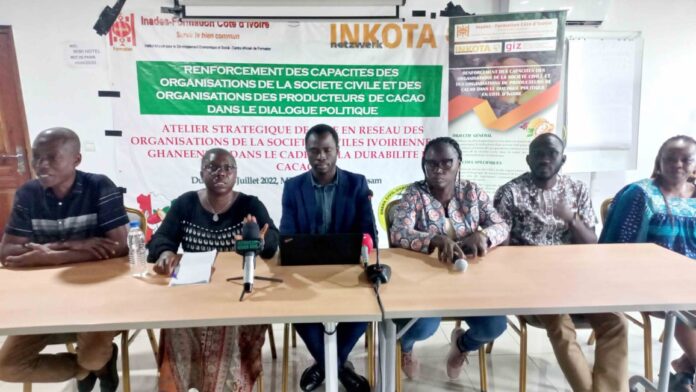
A joint platform of Ghanaian and Ivorian Civil Society Organisations (CSOs) and cocoa farmers have made a strong call for reforms in the international pricing mechanism for cocoa to guarantee a living income for farmers.
The group has recommended that such reforms must take into account the cost of production for the commodity as an integral parameter for determining how much farmers earn for their produce.
“Between Ghana and Cote d’Ivoire we agree that currently, the system for setting the international cocoa prices is not fair on the farmers, not only in Ghana and Cote d’Ivoire but generally,” Obed Owusu-Addai, Co-coordinator of the Ghana Civil-society Cocoa Platform (GCCP), told Cocoa Post exclusively at Grand Bassam, Cote d’Ivoire.
Owusu-Addai noted that the current international pricing architecture for cocoa is determined on the futures market of the New York and London stock exchanges and “does not take into consideration the cost of production of farmers.”
According to him, the Ghanaian and Ivorian CSOs and cocoa farmer groups reached “a consensus that we need to focus on advocacy to try and address that issue to let the international community know that when it comes to setting the international pricing of cocoa they need to factor in the cost of production.”
Cote d’Ivoire – Ghana cooperation on Cocoa
Ghana and Cote d’Ivoire are the world’s top two producers of cocoa, the core ingredient for chocolate, and account for over 60 per cent of the global supply.
However, millions of smallholder cocoa growers from the two neighbouring West African nations, responsible for more than 70 per cent of national production, have for decades wallowed in abject poverty largely due to exploitative prices.
Governments and regulatory authorities in Ghana and Cote d’Ivoire have in recent years joined forces to command improved incomes for their farmers, despite strong resistance.
In 2019, the bilateral initiative by the West African neighbours in partnership with cocoa buyers birthed the $400 per tonne Living Income Differential (LID) a price mechanism designed to help alleviate extreme farmer poverty.
The initiative also led to the establishment of Cote d’Ivoire – Ghana Cocoa Initiative (CIGCI) a permanent body to advance the interest of cocoa farmers.
Ghana Cote d’Ivoire CSOs Join Forces
Taking a cue from the governmental collaboration, a collective of key civil society organisations and cocoa farmer cooperatives in Ghana and Cote d’Ivoire met in Grand Bassam, a city 47 kilometres from the Ivorian capital Abidjan, to network and identify areas of convergence for unified advocacy.
After the days of deliberations, spanning 27-29 July 2022, the Ghana Civil-society Cocoa Platform (GCCP) and its Ivorian counterpart Plateforme Ivoirienne pour le Cacao Durable (PICD) “took decisions to act together and carry out concrete actions” in advocacy to amplify the voices of smallholder cocoa farmers on important issues affecting them.
The two national CSO platforms agreed on four cardinal themes to shape their joint advocacy in the areas of Living Income, Deforestation and Good Management of Natural Resources, Human Rights & Modern Slavery and Good Governance/Accountability and Transparency.
Joint Declaration on Cocoa Sustainability
In a joint communiqué, the spokesperson for the Ivorian platform, Bakary Traoré, challenged the regulatory authorities – Ghana Cocoa Board and the Ivorian Council for Coffee and Cocoa (CCC) – to establish a transparent mechanism for redistributing the LID by developing appropriate policy and implementation documents.
Also as part of reforms at the national level, Traoré added, “We recommend the establishment of a transparent and inclusive mechanism for setting farm-gate prices, taking into account all the relevant parameters that go into producing cocoa by the farmer.”
Deforestation and natural resources management
On deforestation, the Ghanaian and Ivorian CSOs’ advocacy declaration for cocoa sustainability called for the establishment of a national forest monitoring system for cocoa traceability and deforestation assessment.
In addition to that, the CSOs recommended the development of local sustainable land use plans which take into account the socio-cultural dynamics of indigenous communities.
Again, as part of the reforms recommendation are calls for the “revision of in-country pesticide regulation in line with new developments in Western countries which have banned a number of pesticides because of their harmful effects.”
Human Rights and Modern Slavery
The two-nation joint CSO platform noted, in its declaration, that in recent years, authorities in Côte d’Ivoire and Ghana have made progress in the fight against child labour, notably through the establishment of a clear regulatory framework and the creation of specific structures to better combat the challenge.
It, therefore, recommended a change in the definition and context on the subject of child labour by properly situating the issue as human trafficking of children and modern slavery.
“On this basis, we recommend a focus on border control to better fight against child trafficking networks across West African countries,” the declaration read in part.
Good governance / Accountability and transparency
During deliberations, the CSOs and farmer cooperatives observed, particularly in the case of producer price review committees in both Ghana and Cote d’Ivoire, that there was no democratic process for giving cocoa farmers proper representation.
They contended that farmer representatives handpicked by regulatory authorities do not represent the position and aspirations of actual cocoa farmers on critical issues.
On that score, the civil society platforms have recommended to Ghana’s Cocobod and the Ivorian CCC the development of a framework for the establishment of a national representative organisation of cocoa farmers.
The Ivorian and Ghanaian CSOs’ Grand-Bassam Declaration also proposed improved representation and participation of farmer and civil society organisations in decision-making processes by the two regulatory organisations.
Author: Kojo Hayford


